|
||||||||
|
|
|
2017-12-26 ArtNo.46159
◆Review:The baptism of the Holy Spirit (Just refrain choosing)
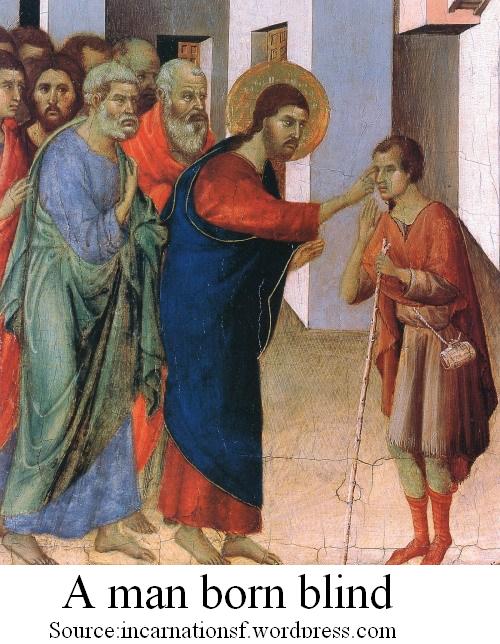 As Jesus was walking along, he saw a man who had been blind from birth. "Rabbi," his disciples asked him, "why was this man born blind? Was it because of his own sins or his parents' sins?" "It was not because of his sins or his parents' sins," Jesus answered. "This happened so the power of God could be seen in him." (John 9:1-3) ○As I seek my sins, I find them unattainable. Time passed to the end of Wei, Jin, and Southern and Northern Dynasties period (220-589 CE) of China, Jianzhi Sengcan chanshi (?-606), who is known as the Third Chinese Patriarch of Zen Buddhism but was still a layman of forty troubled with leprosy at that time, heard that there was a priest of high virtue learned Zen Buddhism originated in India. He immediately went for instruction to the priest, that is, the second patriarch Huike and asked, "I am riddled with leprosy; please absolve me of my sin." 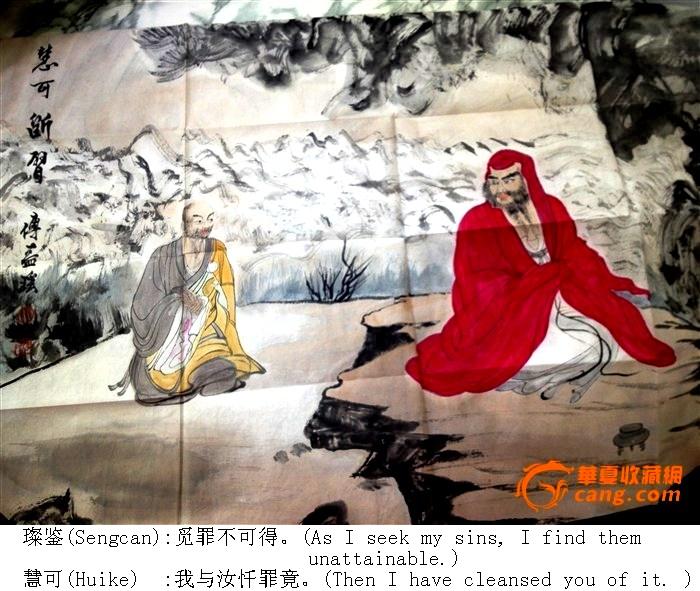 Huike said, "Bring me your sin and I will cleanse you of it." Sengcan thought for awhile; then said, "As I seek my sins, I find them unattainable." Huike replied, "Then I have cleansed you of it. You should live by the Buddha, the Dharma, and Samgha (Brotherhood = monk), and abide therein." Sengcan asked Huike: "I can see you are a monk, what are the Buddha and the Dharma?" Replied the master: "This mind is Buddha, this mind is the Dharma; the Dharma and the Buddha are not separate. This is also true of the Samgha." This satisfied Sengcan, who now said, "Today for the first time I have realized that the essence of sin is not inside, not outside, not in between. So it is also of mind. Buddha and the Dharma are not separate either." Huike saw that Sengcan's understanding is profound, he shaved his head and said: "This is my treasure. I name him Sengcan (Jewel of Samgha)." Then Sengcan devoted to the Buddha, the Dharma, and Samgha under Huike's guidance and he was gradually cured of his illness. (ChuanTengLu, Part 3) ○Jewish mythology of nation-building and the formation of monotheism Following his father Terra who was a polytheist (Joshua 24:2), Abram (Abraham's original name) left Ur in Chaldean region of Mesopotamia and emigrated to Haran in Padang Alam region near the upstream of the Euphrates river. When his father died, he started again to travel to south along the Mediterranean coast and arrived in Canaan. (Genesis 11:31-12:5) Because of a famine, he and his family had to once leave Canaan and move to Egypt. But when they returned to Canaan, Abram covenanted with God and circumcised himself and all members of his clan as the sign of the covenant between God and him and changed his name from Abram to Abraham and changed the name of his wife (his half sister) too from Sarai to Sarah. (Genesis 12:10-17:27) Abraham and his clan seem to have decided to live in Canaan forever and to have discarded their old beliefs in polytheism and converted to indigenous monotheism. 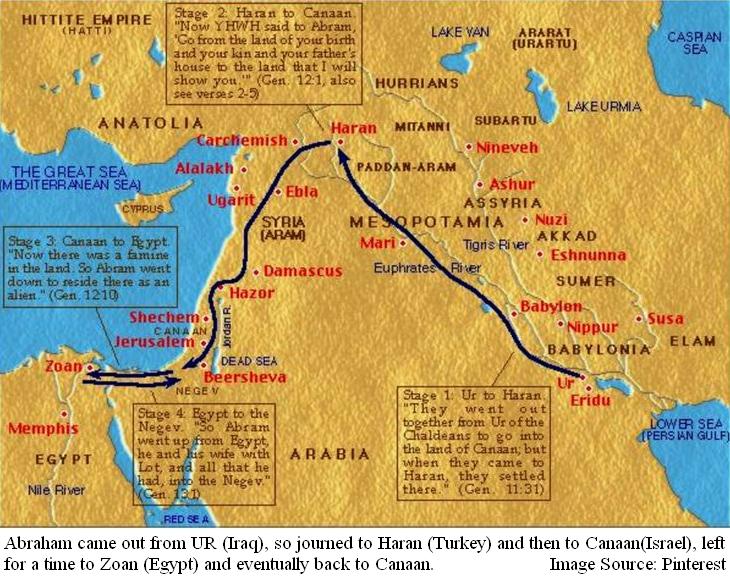 Abraham, who was 75 years old when his father died, begot his first child, Ishmael, of his wife's Egyptian servant Hagar at his 86 years old, circumcised all members of his clan at his 99 years old and begot his second child, Isaac, of his lawful wife, Sarah, in the next year. Following his wife Sarah's death at her 137 years old, Abraham again took a wife called Keturah and begot Zimran, Jokshan, Medan, Midian, Ishbak and Shuah and each of these sons became the ancestors of different tribes. Abraham died at 175 years old and was buried in the cave of Machpelah of Hebron in the land of Canaan together with his wife Sarah by his sons Isaac and Ishmael. (Genesis 25:1-10) Although Abraham's great-grandson Joseph was sold to Midianite merchants as a slave by his brothers, he was placed in charge of the whole land of Egypt (Prime minister?) by the Pharaoh. He moved his entire family to Egypt when a famine came. Abraham's descendants, who had again fallen into slavery after a period of time, led by Moses and escaped from Egypt. So-called the law of Moses, that forms the foundation of Judaism, was formed through a period of time when they wandered the Sinai Desert for 40 years, conquered the indigenous people and finally returned to Canaan. The patriarchs beginning from Abraham avoided to take wives from the local but preferred to take from Haran, their polytheistic homeland, even after they had converted to indigenous monotheism. As the result, the customs of Haran, such as Teraphim (Patron god faith or Idolatry) and incest were maintained among them and often resulted in the disputes at the time of the selection of a successor or heirs of properties. Therefore Moses seems to have tried to wipe out the polytheistic customs of Haran and Egypt through establishing the strict precepts. When Moses led the flock far into the wilderness and came to Sinai, the mountain of God, God called him from the middle of a blazing bush. He said, "I am the God of your father - the God of Abraham, the God of Isaac, and the God of Jacob. It seems that this legend reflects the nation-building myth of the Jewish people consisting of twelve (or fourteen) tribes, named; 1. Reuben, 2. Simeon, 3. Levi, 4. Judah, 5. Issachar, 6. Zebulun, 7. Joseph, 8. Benjamin, 9. Dan, 10. Naphtali, 11. Gad, 12. Asher (and also 13. Manasseh and 14. Ephraim). In other words, these twelve (or fourteen) tribes originally had held different Teraphims, but when they were incorporated into the family of Abraham, their Teraphims are considered to have been integrated into one Guardian deity. ○The diffusion of Judaism and the Synagogue of the Freedmen-Jews 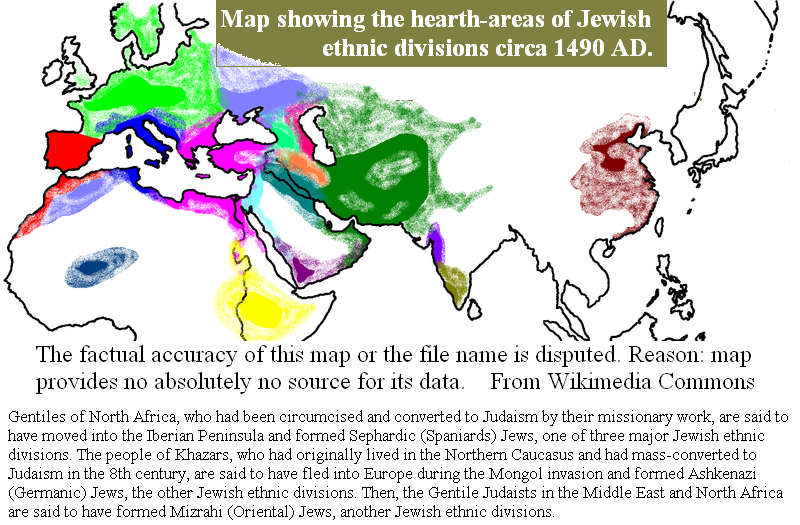 In the era of the Hasmonean dynasty, which built the first unified nation in Palestine except in the mythical era and forced non-Jew residents in Israel to convert into Judaism, the diffusion of Judaism also accelerated in overseas. According to Mr. Shlomo Sand, Professor of history at Tel Aviv University, the Jewish population in Palestine was only about 800 thousand in the 1st century. In contrast, the Jewish population in the world was about 4 million. At its high point there, Judaism was professed by 7 to 8 percent of all the Roman empire's inhabitants. And those who served as the vanguard to increase the Gentile Judaists explosively seem to have been nothing other than the members of the Synagogue of the Freedmen-Jews of Cyrene and Alexandria as well as the provinces of Cilicia and Asia. According to the English version of Wikipedia, the Synagogue of the Libertines (the Synagogue of the Freedmen-Jews) is the assembly of the Freedmen from Rome, descendants of the Jews enslaved by Pompey after his conquest of Judea in 63 BC. The probability is that, Wikipedia explains, there are three, corresponding to the geographical regions involved, Rome and Italy, North East Africa, and Asia Minor; Gentiles of North Africa, who had been circumcised and converted to Judaism by their missionary work, are said to have moved into the Iberian Peninsula and formed Sephardic (Spaniards) Jews, one of three major Jewish ethnic divisions. The people of Khazars, who had originally lived in the Northern Caucasus and had mass-converted to Judaism in the 8th century, are said to have fled into Europe during the Mongol invasion and formed Ashkenazi (Germanic) Jews, the other Jewish ethnic divisions. Then, the Gentile Judaists in the Middle East and North Africa are said to have formed Mizrahi (Oriental) Jews, another Jewish ethnic divisions. ○The church movement was also derived from the Synagogue of the Freedmen-Jews 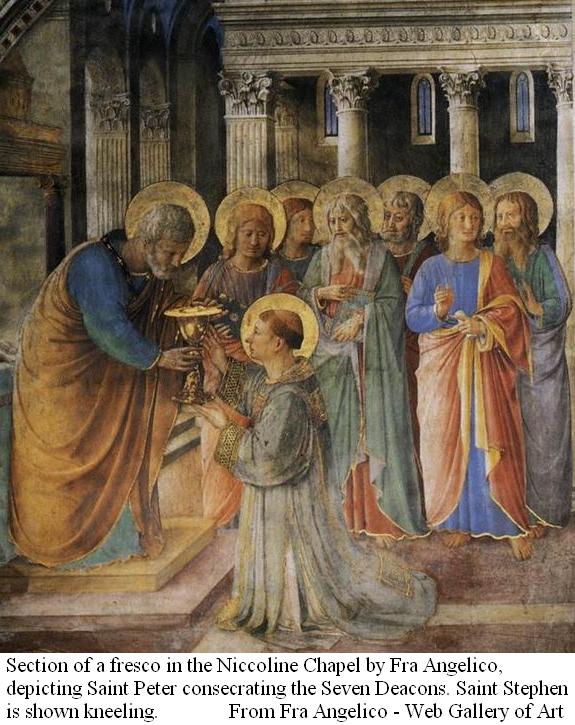 Hellenic believers, who had taken the lead in the Church Movement, were forced to withdraw from the city of Jerusalem under the habitat segregation for Hellenists and Hebraists planned and executed by a man called Saul, that is, Apostle Paul himself in the wake of the martyrdom of Stephen. They founded a new Church in Antioch of Syria. However, the members of the Synagogue of the Freedmen-Jews remained in the city together with the mainstream of Jerusalem Church. Therefore, the members of the Synagogue of the Freedmen-Jews seem to have been intimate not only with the House of Hanan, the clan of the high priest Caiaphas and his father in law Annas, but also with James the Less, who had served as the high priest for the Nazirites in the temple and had been appointed to the first bishop of the Jerusalem Church. The tidal wave of church movement, which had occurred in the Mediterranean coast and finally reached Jerusalem, the headquarters of Judaism, seems to have been also originally derived from the Synagogue of the Freedmen-Jews. In other words without contribution of the Synagogue of the Freedmen-Jews, both Christianity and Islam would not have been born, the birth of Modern Israel too would not have realized and Zen Buddhism also might not have blossomed in China and Japan. ○A pure Jewish community of Hellenists appeared in Rome 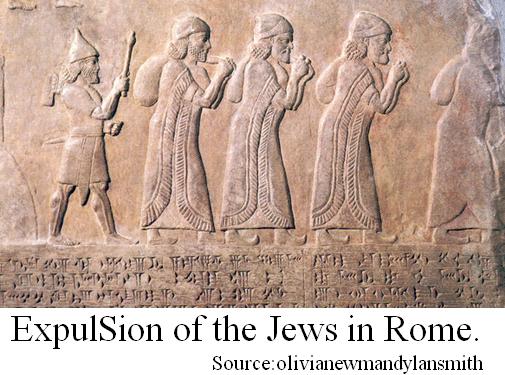 There seems to have been a robust community of Jewish believers when Paul arrived in Rome around AD 59. Perhaps, they were Judaists of gentiles, that is, non-circumcised Judaists. It seems that habitat segregations for Hellenists and Hebraists were taken place in Rome, too, at least three times for past 188 years. However, they were the exact opposite to what Paul had done in Jerusalem. And a pure Jewish community of Hellenists appeared in Rome just as a pure Christian church of Hebraists was born in Jerusalem. In 139 BC the Jews were expelled after being accused of aggressive missionary efforts. Then in AD 19 Tiberius once again expelled Jews from the city for similar reasons. After that, the emperor Claudius ordered all Jews to leave Rome in AD 49. Therefore, it seems to have had an environment easy to accept "the way of Jesus which makes one right with God through faith but not by Mosaic law (Roma 3:28)" taught by Paul. In the last two verses, Acts of the Apostles described Paul's daily life in Rome; For two whole years Paul stayed there in his own rented house and welcomed all who came to see him. Boldly and without hindrance he preached the kingdom of God and taught about the Lord Jesus Christ. (Acts 28:30-31) ○Severe conflict between the two Apostles surfaced in Rome 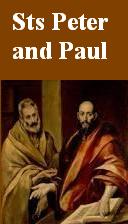 But, because Jews returned to Rome and the Jerusalem Church also sent Peter and other Hebraist missionaries to Rome, the conflict between Paul and the Jerusalem Church surfaced in Rome, too. "The First Epistle of Clement," which the Church of Rome sent to the Church of Corinth at about 95-97 AD, hinted that severe tensions had arisen within the Church of Rome, due to the conflict between the two Apostles after Peter had come to Rome. After two years of his arrival in Rome, Paul seems to have been martyred between AD 60-62. According to 'Acts of Paul,' because Crucifixion was adapted only to slaves or heavy criminal and Paul was a Roman citizen, so he was not crucified, but was beheaded after the trial. But Peter seems to have been crucified around AD 64 in Rome. ○The Way is simpl. Just refrain choosing. 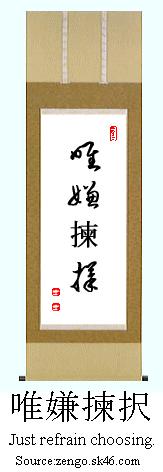 One day a monk asked Zhaozhou Congshen (778-897), one of the great Chan (Zen) masters during the later period of the Tang Dynasty in China, served as the abbot of a temple called Guanyin-yuan, "The third patriarch Jianzhi Sengcan chanshi said in his book 《Xinxinming (Inscribed on the Believing Mind)》, 'The supreme Way is not difficult; it simply dislikes choosing.' What is non-choosing?" ZhaoZhou said, "Holy am I alone throughout heaven and earth." The monk said, "That is still choosing." ZhaoZhou howled out, "You stupid bumpkin, where is the choosing?" The monk remained silent. Another monk asked ZhaoZhou, "'The supreme Way is not difficult; it simply dislikes choosing.' Isn't that the hideout of Zen Buddhists? Just as birds flying in the sky need nests to rest their wings." ZhaoZhou said, "Once someone asked me like that. I am sorry that even after five years I still can't give an answer to it." Then, the other monk asked ZhaoZhou, "'The supreme way is not difficult, it simply dislikes choosing. But even if a word is uttered, it is already an action of 'choosing.' -- Then how can you, Master, try to lead other people?" ZhaoZhou said, "Why don't you quote the sentence to the end? (There are lower phrases saying, 'Just do not hate or love, and it will be thoroughly clear.' and so, aren't there?)" The monk said, "Sorry, I just read until this part." ZhaoZhou said, "Oh is that so." And he muttered, "It's only: 'The supreme way is not difficult; it simply dislikes choosing.'"<To be continued> [Reference] ○《Jingde Chuandeng-lu, Part 3》 The thirtieth patriarch Jianzhi Sengcan went for instruction to the twenty-ninth patriarch Huike and asked, "I am riddled with sickness (said to be leprosy); please absolve me of my sin." Huike said, "Bring me your sin and I will absolve you." Sengcan thought for awhile; then said, "As I seek my sins, I find them unattainable." Huike replied, "I have absolved you. You should live by the Buddha, the Dharma, and Samgha (Brotherhood), and abide therein." Sengcan asked Huike: "I can see you are a monk, a member of the Buddhist community; what are the Buddha and the Dharma?" Replied the master: "This mind is Buddha, this mind is the Dharma; the Dharma and the Buddha are not separate. This is also true of the Samgha." This satisfied Sengcan, who now said, "Today for the first time I have realized that the essence of sin is not inside, not outside, not in between. So it is also of mind. Buddha and the Dharma are not separate either." Huike saw that Sengcan's understanding is profound, he shaved his head and said: This is my treasure. I name him Sengcan (Jewel of Samgha). (The rest is omitted.) ○《Xinxinming》 The Ultimate Way is without difficulty; it's only averse to discrimination: Just do not hate or love, and it will be thoroughly clear. A hairsbreadth's miss is as the distance between sky and earth. If you want to have it appear before you, don't keep conforming and opposing. Opposition and conformity struggling become a sickness in the mind. If you don't know the hidden truth, you work in vain at quieting thought. It is complete as space itself, without lack or excess. (Translator, unknown: The rest is omitted.) ○《The Blue Cliff Record》Case 57: ZhaoZhou's 'The supreme Way is not difficult' A monk asked ZhaoZhou, "'The supreme Way is not difficult; it simply dislikes choosing.' What is non-choosing?" ZhaoZhou said, "Holy am I alone throughout heaven and earth." The monk said, "That is still choosing." ZhaoZhou said, "You stupid bumpkin, where is the choosing?" The monk remained silent. ○《The Blue Cliff Record》Case 58: ZhaoZhou and the "nest" A monk asked ZhaoZhou, "'The supreme Way is not difficult; it simply dislikes choosing.' Isn't that the nest of the people of our time?" ZhaoZhou said, "Once someone asked me like that. I am sorry that even after five years I still can't give an answer to it." ○《The Blue Cliff Record》Case 59: ZhaoZhou's "simply dislikes choosing" A monk asked ZhaoZhou, "'The supreme way is not difficult, it simply dislikes choosing.' But even if a word is uttered, it is already an action of 'choosing.' -- Then how can you, Master, try to lead other people?" ZhaoZhou said, "Why don't you quote the sentence to the end?" The monk said, "Sorry, I just read until this part." ZhaoZhou said, "It's only: 'The supreme way is not difficult; it simply dislikes choosing.'" 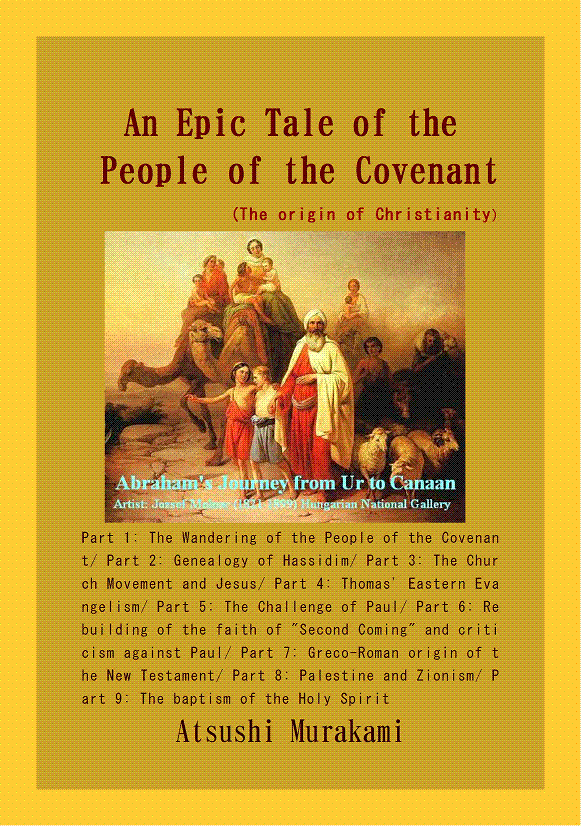 ○What is "Baptism with The Holy Spirit"? According to the dialectic of the Gospel of John, 【Thesis】"A man can possess eternal life through accepting testimony of the Son of man and being baptized by him." (John 5:24) 【Anti-thesis】But "The one who comes from the earth cannot accept the testimony by one from heaven."(John 3:32) How then can a man possess eternal life? 【Synthesis】"If you want to be baptized with the Holy Spirit, you can just go back to the word which was with God in the beginning (John 1:1) and certify that God is truthful. (John 3:33)" When he said, "You are Huichao," Zen Master Fayan thrusted vivid Self in Huichao in front of his eyes. Purchase here ○One world:The aim of SEAnews ◆Recruitment of Ad-SEAnews CanvassersYour Comments / UnsubscribeSEAnews TwitterSEAnews MessengerSEAnewsFacebookSEAnewsGoogleSEAnews eBookstoreSEAnews eBookstore(GoogleJ)SEAnews world circulation |
|
[Your Comments / Unsubscribe]/[您的意见/退订]/[ご意見/配信停止]
Please do not directly reply to the e-mail address which is used for delivering the newsletter. 请别用递送新闻的邮件地址而直接回信。 メールをお届けした送信専用アドレスには返信しないで下さい。 |